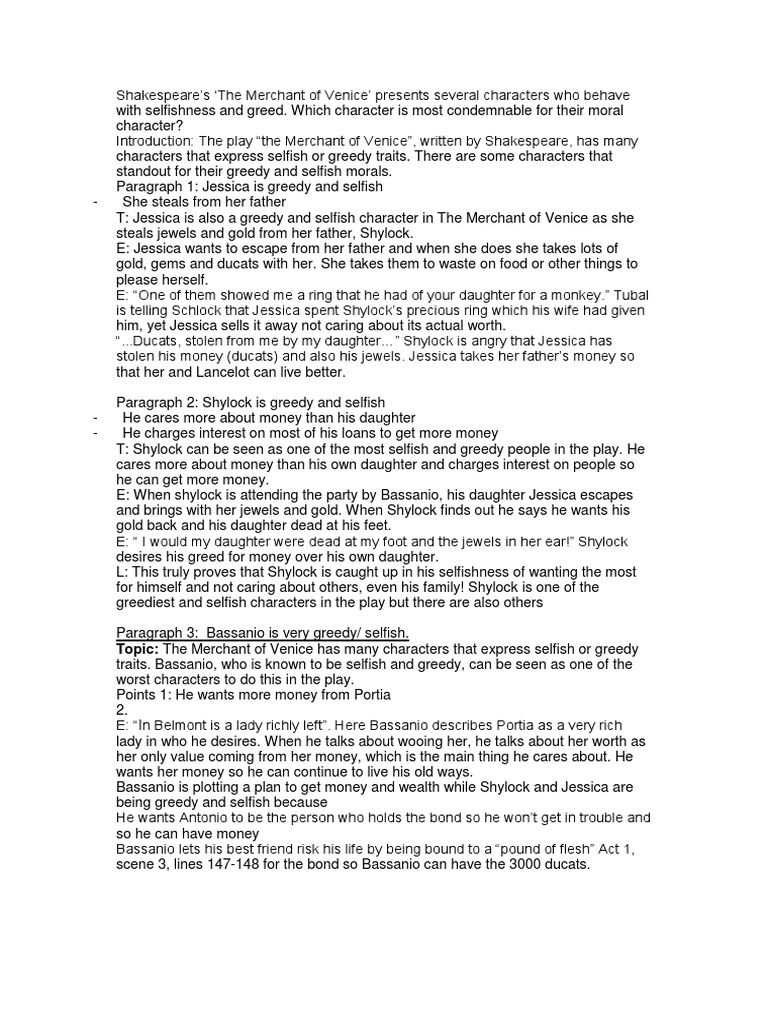
· Merchant of Venice is a play in the 16th century that was written by the infamous writer, Shakespeare. Just like many other of his play, the story is The Merchant of Venice is classified as a tragicomedy, because it shares features in common with comedies but also contains the kind of dark elements we typically find in tragedies Essay Writing Service. The primary criticism regarding Anti-Semitism within The Merchant of Venice is the presentation of Shylock. His portrayal as the stereotypical Elizabethan Jew has caused much controversy, gaining further poignancy after the play’s use as Nazi propaganda The Merchant of Venice and Woman. The play “The Merchant of Venice” was written in the 16th century. According to Veniceorg, “The ideal Venetian woman was quiet, subservient and focused on the home- her role was to manage the home and family. She rarely ever left and was identified through her relationship to her male relatives
Merchant of Venice Essays | GradeSaver
Examine the courtroom scene in The Merchant of Venice. How does it illuminate the play's major themes? This argument mirrors several smaller disputes and personal crises throughout The Merchant of Venice, the merchant of venice essays. By placing the conflict at the center of his play, Shakespeare suggests that the pains of sacrifice are inescapable.
It is human to resent, and it is human to forgive. The courtroom scene enacts a crisis all humans must someday face: whether to pardon an enemy or insist on revenge. Portia speaks on behalf of mercy, arguing that we must always forgive one another because we are constantly hoping for our own share of forgiveness from an all-knowing God.
On the other hand, Shylock represents the all-too-human desire for justice. Invoking the supremacy of justice, she says he may have a pound of flesh but not a drop of blood, with the threatened penalty of death if he does not follow her terms exactly. Mercy and justice—forgiveness and vengeance—spar relentlessly in this climactic scene.
Shakespeare has laid the thematic groundwork for his climax by repeatedly noting the virtues of a merciful way of life. Portia forgives The merchant of venice essays for leaving Belmont on the night of their engagement, putting aside her own wishes and encouraging him to help his friend. Jessica and Lorenzo repeatedly note the necessity of good humor; it is in the nature of lovers to stray and to make false promises, so we must try the merchant of venice essays laugh and see what is best in one another.
Each of these characters acts as an occasional spokesperson for the mild-mannered, magnanimous approach to life. Despite his constant sacrifices, Antonio becomes irritating when he seems to brood on his sense of perpetual martyrdom, and Gratiano urges him to abandon his silent grievances and enjoy his life, the merchant of venice essays. Long before the courtroom scene, Shylock embodies the human desire for revenge, asking why he should cooperate with Antonio when Antonio has ignored him and called him a cur.
The Prince of Arragon seems absurd when he claims Portia on the grounds that he deserves her, the merchant of venice essays, and the message in the silver casket rebukes him for thinking that we are ever naturally entitled to happiness. By pitting mercy against justice in his climactic scene, Shakespeare suggests that everyone struggles with competing urges to complain and forgive.
Shylock demands the flesh the law has promised him, and Portia argues that the world is too complex to be governed by rigid laws. Portia, Antonio, and Lorenzo all occasionally look past their own problems and behave generously, whereas other characters cannot overcome a gnawing sense of grievance and injustice. In five tolerant, effortless acts, Shakespeare shows us that we are destined to have these arguments—with others and with ourselves—every day of our lives.
Ace your assignments with our guide to The Merchant of Venice! Search all of SparkNotes Search Suggestions Use up and down arrows to review and enter to select.
No Fear Literature Translations Literature Study Guides Glossary of Literary Terms How to Write Literary Analysis. Biography Biology Chemistry Computer Science Drama Economics Film Health History Math Philosophy Physics Poetry Psychology Short Stories Sociology US Government and Politics.
SparkTeach Teacher's Handbook. Character List Shylock Portia Antonio Jessica Bassanio. Themes Motifs Symbols Protagonist Antagonist Setting Genre Style Point of View Tone Foreshadowing. How does Bassanio win the right to marry Portia? Important Quotes Explained By Theme Friendship Wealth Prejudice Revenge Love.
Suggestions for Further Reading Related Links Movie Adaptations William Shakespeare and The Merchant of Venice Background. Previous section Mini Essays Next section Suggested Essay Topics.
The Merchant of Venice SparkNotes Literature Guide EBOOK EDITION Ace your assignments with our guide to The Merchant of Venice! Popular pages: The Merchant of Venice, the merchant of venice essays. Take a Study Break.
The Merchant of Venice Video Summary
, time: 7:25Merchant of Venice Essay | Bartleby

Examine the courtroom scene in The Merchant of Venice. How does it illuminate the play's major themes? Shakespeare’s courtroom scene dramatizes a conflict between justice and mercy—the competing claims of an angry Shylock and a desperate Bassanio. This Essay on merchant of venice Words | 6 Pages. The Merchant of Venice The play, ¡°The Merchant of Venice¡± by William Shakespeare has two main settings. One setting is Venice, a city where many businessmen live, a place, full of unhappy and unkind people. It a world of commercial and law The Merchant of Venice. Words: (3 pages) Disguise Theme in three Plays: Il Volpone, The Second Shepherds Play and The Merchant Of Venice It was the 16 century when the idea of disguise started to be used in many plays.. It is used as an escape from the characters personalities and sometimes for
No comments:
Post a Comment